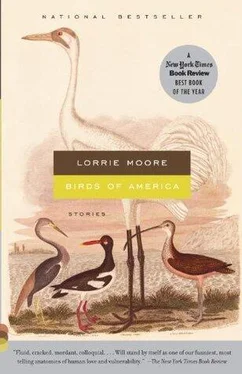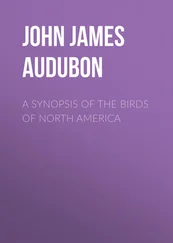“Pardon?” said Noel.
“Are you married?” she asked.
He gave her a tired little smile and said, “No. Trying to make it happen with a girlfriend, but no, not married.”
“That’s probably better,” said Ruth.
“How about this vegetable garden?” he asked nervously.
“It’s just a lot of grass with a rhubarb in it,” said Ruth. “I’d like to dig the whole thing up and plant roses — unless you think it’s bad luck to replace food with flowers. Vanity before the Lord, or something.”
“It’s up to you,” he said.
She called him back that night. He personally, no machine, answered the phone. “I’ve been thinking about the sunflowers,” she said.
“Who is this?” he said.
“Ruth. Ruth Aikins.”
“Oh, say, Ruth. Ruth! Hi!”
“Hi,” she said in a worried way. He sounded as if he’d been drinking.
“Now what about those sunflowers?” he asked. “I’d like to plant those sunflowers real soon, you know that? Here’s why: my girlfriend’s talking again about leaving me, and I’ve just been diagnosed with lymphoma. So I’d like to see some sunflowers come up end of August.”
“Oh, my God. Life stinks!” cried Ruth.
“Yup. So I’d like to see some sunflowers. End of summer, I’d like something to look forward to.”
“What kind of girlfriend talks about leaving her beau at a time like this?”
“I don’t know.”
“I mean — good riddance. On the other hand, you know what you should do? You should make yourself a good cup of tea and sit down and write her a letter. You’re going to need someone to care for you through all this. Don’t let her call all the shots. Let her understand the implications of her behavior and her responsibilities to you. I know whereof I speak.”
Ruth was about to explain further, when Noel cleared his throat hotly. “I don’t think it’s such a great idea for you to go get personal and advising. I mean, look. Ruth , is it? You see, I don’t even know your name, Ruth. I know a lot of Ruths. You could be goddamned anyone. Ruth this, Ruth that, Ruth who knows. As a matter of fact, the lymphoma thing I just made up, because I thought you were a totally different Ruth.” And with that, he hung up.
She put out cages for the squirrels — the squirrels who gnawed the hyacinth bulbs, giving their smooth surfaces runs like stockings, the squirrels who utterly devoured the crocuses. From the back porch, she watched each squirrel thrash around in the cage for an hour, hurling itself against the cage bars and rubbing bald spots into its head, before she finally took pity and drove each one to a faraway quarry to set it free. The quarry was a spot that Terence had recommended as “a beautiful seclusion, a rodent Eden, a hillside of oaks above a running brook.” Such poetry: probably he’d gotten laid there once. Talk about your rodent Eden! In actuality, the place was a depressing little gravel gully, with a trickle of brown water running through it, a tiny crew of scrub oaks manning the nearby incline. It was the kind of place where the squirrel mafia would have dumped their offed squirrels.
She lifted the trapdoor and watched each animal scurry off toward the hillside. Did they know what they were doing? Would they join their friends, or would every last one of them find their way back to the hollow walls of her house and set up shop again?
The bats — bats! — arrived the following week, one afternoon during a loud, dark thundershower, like a horror movie. They flew back and forth in the stairwells, then hung upside down from the picture-frame molding in the dining room, where they discreetly defecated, leaving clumps of shiny black guano pasted to the wall.
Ruth phoned her husband at his office but only got his voice mail, so she then phoned Carla, who came dashing over with a tennis racket, a butterfly net, and a push broom, all with ribbons tied around their handles. “These are my housewarming presents,” she said.
“They’re swooping again! Look out! They’re swooping!”
“Let me at those sons of bitches,” Carla said.
From her fetal position on the floor, Ruth looked up at her. “What did I ever do to get such a great friend as you?”
Carla stopped. Her face was flushed with affection, her cheeks blotched with pink. “You think so?” A bat dive-bombed her hair. The old wives’ tale — that bats got caught in your hair — seemed truer to Ruth than the new wives’ tale — that bats getting caught in your hair was just an old wives’ tale. Bats possessed curiosity and arrogance. They were little social scientists. They got close to hair — to investigate, measure, and interview. And when something got close — a moth to a flame, a woman to a house, a woman to a grave, a sick woman to a fresh, wide-open grave like a bed — it could fall in and get caught.
“You gotta stuff your dormer eaves with steel wool,” said Carla.
“Hey. Ain’t it the truth,” said Ruth.
They buried the whacked bats in tabbouleh containers, in the side yard: everything just tabbouleh in the end.
· · ·
With the crows in mind, Ruth started to go with Carla to the shooting range. The geese, Carla said, were not that big a problem. The geese could be discouraged simply by shaking up the eggs in their nests. Carla was practical. She had a heart the shape of an ax. She brought over a canoe and paddled Ruth out into the cattails to find the goose nests, and there she took each goose egg and shook it furiously. “If you just take and toss the egg,” explained Carla, “the damn goose will lay another one. This way, you kill the gosling, and the goose never knows. It sits there warming the damn eggnog until the winter comes, and the goose then just leaves, heartbroken, and never comes back. With the crows, however, you just have to blow their brains out.”
At the shooting range, they paid a man with a green metal money box twenty dollars for an hour of shooting. They got several cans of diet Coke, which they bought from a vending machine outside near the rest rooms, and which they set at their feet, at their heels, just behind them. They each had pistols, Ruth’s from World War I, Carla’s from World War II, which they had bought in an antique-gun store. “Anyone could shoot birds with a shotgun,” Carla had said. “Let’s be unique.”
“That’s never really been a big ambition of mine,” said Ruth.
They were the only ones there at the range and stood fifty yards from three brown sacks of hay with red circles painted on them. They fired at the circles — one! two! three! — then turned, squatted, set their guns back down, and sipped their Cokes. The noise was astonishing, bursting through the fields around them, echoing off the small hills and back out of the sky, mocking and retaliatory. “My Lord!” Ruth exclaimed. Her gun felt hard and unaimable. “I don’t think I’m doing this right,” she said. She had expected a pistol to seem light and natural — a seamless extension of her angry feral self. But instead, it felt heavy and huge and so unnaturally loud, she never wanted to fire such a thing again.
But she did. Only twice did she see her hay sack buckle. Mostly, she seemed to be firing too high, into the trees behind the targets, perhaps hitting squirrels — perhaps the very squirrels she had caught in her have-a-heart cage, now set free and shot dead with her have-a-house gun. “It’s all too much,” said Ruth. “I can’t possibly be doing this right. It’s way too complicated and mean.”
“You’ve forgotten about the damn crows,” said Carla. “Don’t forget them.”
“That’s right,” said Ruth, and she picked up the gun again. “Crows.” Then she lowered her gun. “But won’t I just be shooting them at close range, after I catch them in nets?”
Читать дальше












